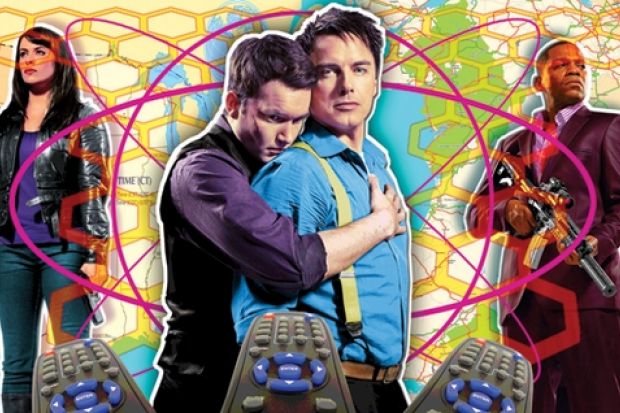Previously, on Torchwood: there's a lot of backstory. Torchwood was originally an in-joke, an anagram of Doctor Who that grew into a spin-off from the long-running show. Its main protagonist, Captain Jack Harkness (John Barrowman), was an anagram, or analogue, of the Doctor himself, a shake-up of the familiar archetype: a dashing time-traveller with an American rather than an English accent, with a pan-sexual libido in place of the Doctor's charming reserve.
In the fictional world, Torchwood was an institute established by Queen Victoria in 1879 and dedicated to seeing off extraterrestrial threats; in our real one, Torchwood, promoted as Doctor Who for grown-ups, never fully found its tone or its audience, and shuttled from channel to channel like a spaceship countdown - BBC Three, Two, One - before relaunching this summer as a new series, co-produced by the BBC and US network Starz.
Raymond Williams, the Welsh cultural scholar, wrote in 1974 of the baffling "flow" of American television: "I believe I registered some incidents as happening in the wrong film, and some characters in the commercials as involved in the film episodes." Williams' account was prescient, a kind of television time travel, because Torchwood: Miracle Day (BBC One, Thursdays from 14 July for 10 weeks, 9pm) is a choppy ride, from Wales to the US. The first two episodes switch from Cardiff Bay to Kentucky, from Washington DC to Rhossili, following the twin stories of Gwen Cooper (Eve Myles), the last remaining Torchwood operative, and a new Stateside character, CIA agent Rex Matheson (Mekhi Phifer). It takes Jack to bring the threads together - and a government rendition to bring Gwen and Jack to the US, where the story proper can begin.
It's big-budget and high-concept. Suddenly, one day, nobody dies. Babies are still born, disease still spreads, but nobody dies. Torchwood and the CIA must team up to find out whether this continuing "Miracle Day" was planned, and if so, who by and why. By episodes three and four they're asking the key question, cui bono? - who profits? The drugs company PhiCorp, and the latter-day prophets such as convicted murderer Oswald Danes (Bill Pullman), who was spared death by lethal injection and is now styling himself as a media guru.
It still feels like flicking across channels, dipping into various cop shows and medical dramas. Operatives are bathed in the cold blue light of computer terminals as they give orders to field agents running down corridors. Digits flash up on screen; talking heads on television update us on the media discourse. It's a compilation of good-looking US shows from CSI through 24 to The X Files. And yet, despite the talk of Twitter feeds, it becomes another form of television time travel: like watching US shows in the 1980s. The heists are straight out of The A-Team. The technology is generic try-hard "futuristic" but weirdly dated: there's even a car with an illuminated control panel, like KITT from Knight Rider. The music doesn't help, slathering on Jean Michel Jarre-style keyboards to tell us we're witnessing a character moment, and rocking out like Dire Straits at the first sign of action - the lead guitar and drums even kick in when Rex is crossing the road eating a hot dog.
Considering the concept, and despite the urgent soundtrack, Torchwood is slow and conventional. No innovations in the camerawork and editing - just shot reverse shot, alternating with steady rhythm between characters until the end of each scene - and each scene has a leisurely pace. We spend five minutes with minor characters such as Rex's dad, and cut back to Cardiff to Gwen's family.
The only slight twist here is Jack's encounter with a cute barman, which - like the straight sex in the same episode - is shot like Blade Runner, all moody light and slatted blinds, and feels like a clip of 1980s soft-core in the middle of Miami Vice. But it introduces a more interesting way of viewing, and encourages us to see the tentative friendship between Gwen and CIA analyst Esther, the love-hate dynamic between Gwen and Jack, and even the sparring between Jack and Rex, from a different set of possible angles: the same-sex pairing of buddy movies and the will-they, won't-they platonic partnership of crime shows are queered just a little and put into question.
Jack's polymorphous energy and the inventively gothic glimpses of what new horrors could evolve in a world without death - a still-living corpse flayed by an explosion; a human eye still blinking in a crushed car - may be Torchwood's saving grace. It still has the potential to keep going long term, like Lost; or it could go the way of Heroes, which started well before staggering into half-life, and FlashForward, which was put out of its misery after a season. It's not dead yet, touch wood.
Register to continue
Why register?
- Registration is free and only takes a moment
- Once registered, you can read 3 articles a month
- Sign up for our newsletter
Subscribe
Or subscribe for unlimited access to:
- Unlimited access to news, views, insights & reviews
- Digital editions
- Digital access to THE’s university and college rankings analysis
Already registered or a current subscriber?
